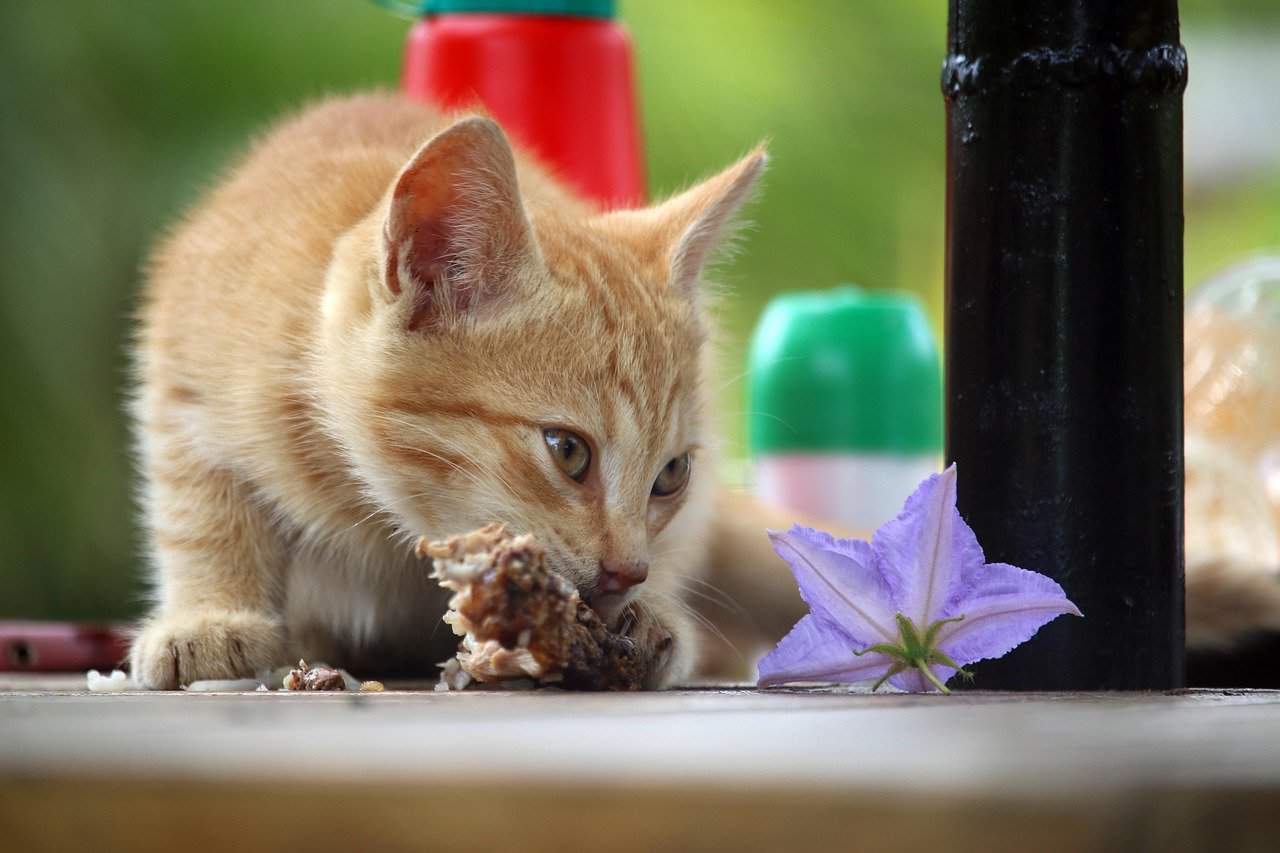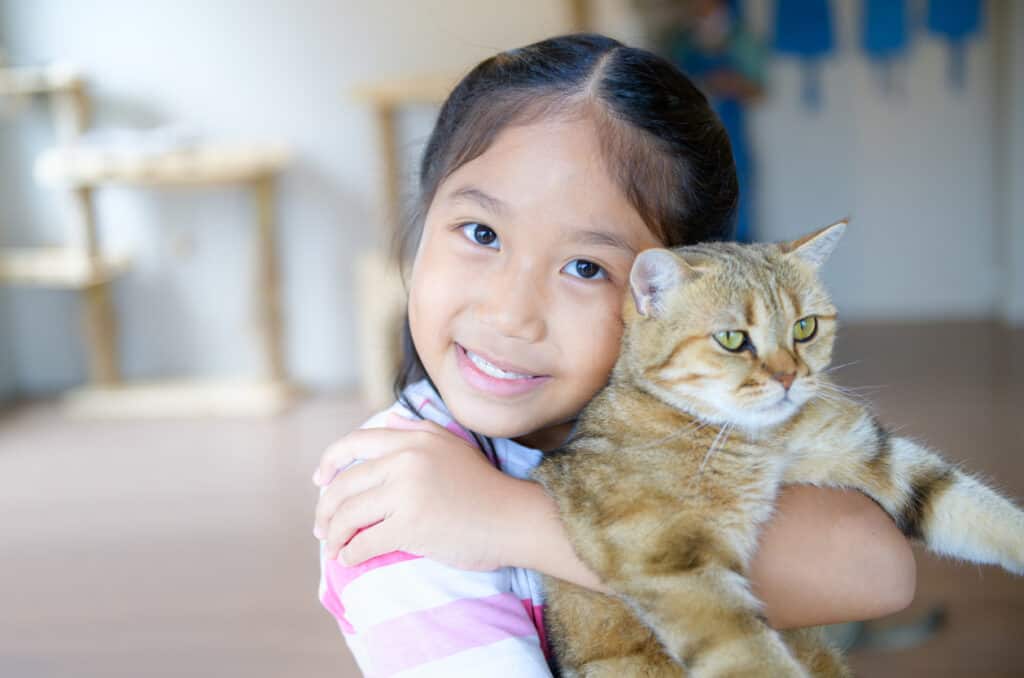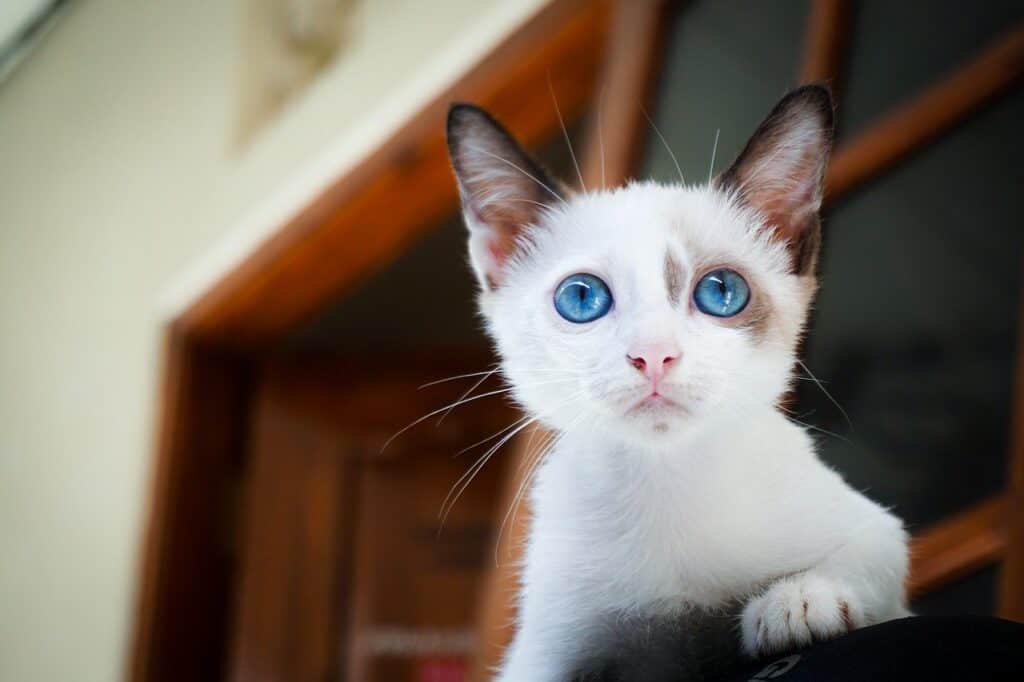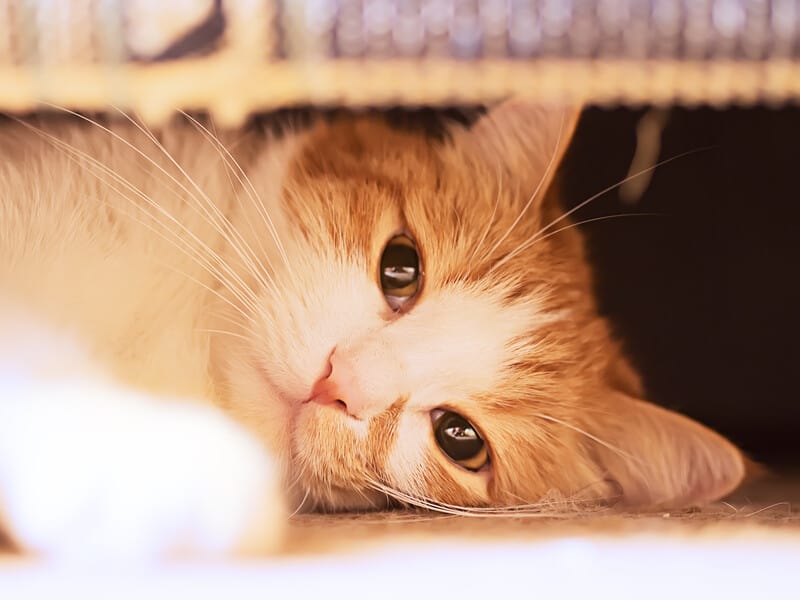Twenty seconds ago, you left your breakfast alone in the kitchen while searching for something. When you come back, the cat is having a feast with your breakfast.
Some people would find this disgusting and leave it to the cat. But, you might be thinking, can I just finish what’s left on the plate?
Let’s answer the question that’s on every cat owner’s mind when this happens;
Can you eat food after your cat licked it?
Eating food after a cat touched it, it’s mostly safe. Viruses won’t usually cross between species, and if you’re healthy, your immune system can deal with most bacteria transferred from the cat to you. However, cats can carry zoonotic diseases that can spread to humans, and especially kids and pregnant women should be extra careful.
Everything described here also applies to kissing your cat on the mouth or your cat licking your face, something that most people do not have a problem with.
Of course, it’s always best not to let your cat lick your food or eat from the same plate. The question is, is it dangerous, and should you be worried if it happens?
can you get sick from sharing food with your cat?
In most cases, eating or drinking something after a cat licked it shouldn’t cause any concern. The human immune system is very good at detecting most zoonotic diseases and protecting you from them by eradicating them.
Honestly, the chances of you getting sick from a cat are very slim.
That being said, some people should be more careful and not take any chances—especially people who happen to be immunocompromised, infants, and pregnant women.

The kind of cat makes a difference
If you have a healthy indoor cat, you shouldn’t worry too much. An outdoor cat, on the other hand, might be riskier.
I’d also be cautious with cats you don’t know. Feral or stray cats may carry diseases that your house cat may not, and they are, in general, less clean than your own kitty.
You can never tell where they’ve been and what they’ve touched. Even if the chance you’ll get sick is low, it’s better to be safe than to be sorry.
Think twice before eating something the cat licked. Only heaven knows what that cat had in its mouth before biting your meal.
Cats like licking weird stuff
You know how cats are. Cats are famous for being curious by nature. They will eat almost anything that moves, especially if it’s smaller than them.
Cats also chew and lick weird things. You can find them licking their butts, chewing plants, or even eating vomit and litter.
Since you never know what your cat has licked, you could be exposing yourself to a pathogen when saliva is transferred between your cat and you.
If your cat never leaves the house, the risk is low, but if your cat loves street adventures, you never know.
Can cats transmit diseases to humans?
Some diseases can transfer from cats to humans. Pathogens that are harmful to both humans and animals are so-called ‘zoonotic diseases. Feline zoonosis is when a disease passes from a cat onto a human.
Most cat diseases only affect them, in the same way that most human infections won’t make cats sick. But few of them are harmful to humans as well as cats.
We have listed some of the most well-known feline zoonotic diseases and linked them to some authoritative sources where you can find more detailed information.
Some of these infections are pretty rare (especially for clean and well-cared for) indoor cats. Others are more common, like toxoplasmosis.
Pet owners would best avoid contact with any infected animal carrying a potential zoonotic infectious disease (basically all stray and feral cats).
- Rabies,
- Capnocytophaga,
- Pasteurellosis,
- Cat scratch disease,
- Ringworm,
- Sporotrichosis,
- Tularemia,
- Plague,
- Q fever,
- Campylobacteriosis,
- Salmonellosis,
- Infections with pathogenic E. coli,
- Cryptosporidiosis,
- Giardiasis,
- Toxoplasmosis,
- MRSA
- Some fungal infections
Although it’s good to be careful, there’s no reason to get scared of cats or be paranoid about them. Our immune system is capable of fending off most, if not all, of these viruses.
Nevertheless, if you know you have a high risk of infection because you might have been exposed to a cat (or dog, rodent) carrying one of these diseases, or when a stray cat has bitten you, it’s best to get tested at your local hospital or MD.
Can I get sick from drinking the same water as my cat?
It would help if you didn’t make it standard practice to share drinking bowls between yourself and your cat.
However, as stated, if your cat took a sip from your delicious drink, the same applies when they touch your food. The risk of getting sick from it is relatively low.
What diseases can I get from eating something my cat licked?
Everyone knows that cats love licking things. And if there’s something they love licking is their butts and their paws. Some parasites can spread from cats to humans if you get in contact with their feces.
Yes, your cat might have feces on its mouth. This actually means that they’re doing a great job at cleaning themselves, you know, licking their butt.
So there’s always the risk of getting infected with some parasites.
Here are some diseases that spread on a cat’s poop:
- Toxoplasmosis.
- Roundworms.
- Hookworms.
- Salmonellosis.
- Giardiasis.
- Campylobacteriosis.
- Cryptosporidiosis.
These parasites and bacteria can live inside your cat and spread through their poop. However, getting one of these infections is rare. Cats with these conditions often have loose stools or diarrhea.
Your cat would have to lick its butt, lick some feces, and then rush to bite your food to transfer the parasite. And even if you do get one of them, your body will probably fight them before they become a threat.
Is cat saliva dangerous?
Great news for cat lovers: cat saliva is not dangerous to humans in most cases. Now, before you go in for a cat kiss, you have to know that there are certain moments where it can be dangerous.
Cat saliva can be harmful if the cat has:
- Rabies.
- Cat scratch fever.
- Or if you’re allergic to cats.
Cat’s also have a protein in saliva called “Fel d1”. Fel d1 is a protein that cats also expel from the sebaceous glands of their skin. Fel d1 is what makes people allergic to cats.
Can you get rabies from food your cat licked?
It is possible to get rabies from a cat, but this is very, very uncommon.
So don’t worry; there’s no reason to panic. Rabies might be highly contagious, but your average household cat sure doesn’t have it.
A cat with rabies is something you would notice. So if your cat isn’t producing excessive saliva and is subject to violent and involuntary movements or spasms, it’s not rabies.
Who should be extra careful?
Some people are more susceptible to feline zoonotic infections.
- Pregnant women.
- Immunocompromised people.
- People over 65 years old.
- Young children.
- People who have an organ transplant.
This doesn’t mean that people who belong to those groups cannot own or be around cats. It just means that they should be more careful and pay extra attention to hygiene.
Ideally, people with these conditions shouldn’t clean the litterbox and frequently wash their hands after interacting with cats.
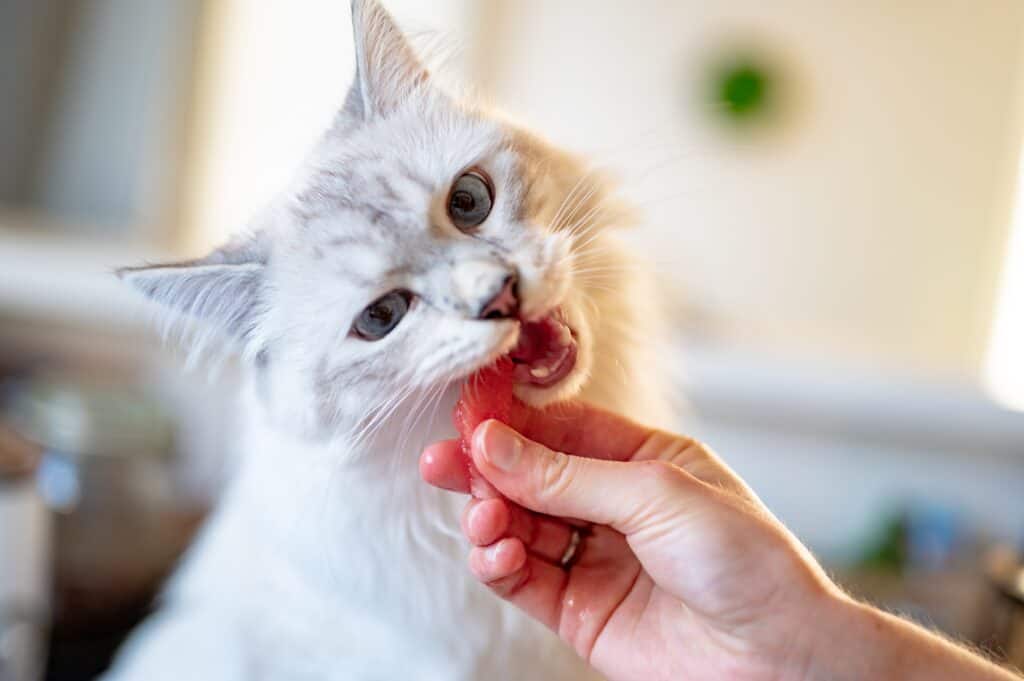
Keeping your cat healthy and hygiene best practices
The most important way to minimize the risk of infections is by having a healthy cat!
There are certain things you can do to reduce the risk of diseases in your cat. If you have a healthy cat, sharing a meal or two shouldn’t be a big deal.
Do your regular vet-checkups
Make sure to take your cat to regular checkups with your veterinarian. At least annually, but for kittens and older cats, we’d advise doing bi-annual checkups.
Talk with your vet to see if your cat is in good condition. And always remember to visit them if your cat gets sick, has diarrhea, looks tired, or suddenly exhibits different behavior.
Be sure to get your cat vaccinated against rabies and feline distemper.
Indoor cats are healthier than outdoor cats
Indoor cats spend a lot of time, you guessed it, indoors. Being inside reduces their chance of getting infected with weird parasites and bacteria.
However, some indoor cats like to sneak out and run around the neighborhood for fun—neutering or spaying them to prevent them from doing this.
Outdoor cats, on the other hand, are more susceptible to their environment. They eat raw meat, drink stagnated water, and often fight other cats. All of this makes them an ideal host for parasites and fungi.
Generally speaking, if your cat is indoors and in good health, licking your food won’t put you at risk.
Clean the litter box
Do we need to explain why keeping the litterbox clean is a must? It’s not just the smell; a dirty litterbox can be a cesspool of bacteria and parasites.
If your cat does have an infection or a disease, cat feces are a strong contamination point. Remember that your cat steps there and increases the chances of spreading parasites and viruses.
Keep the litter box away from the kitchen, and clean it regularly with hot water and disinfectant. If there’s an immunocompromised person or a pregnant woman, don’t let them handle the litter box. Always wash your hands after cleaning the litter box.
Wash your hands
In a world after COVID-19, we should all be used to this but washing our hands frequently protects us from most infections and bacteria.
Wash your hands all the time. After all, it is the most common way for parasites to get inside your body and attack you.
Washing our hands before touching food or cooking is our best and most efficient way to prevent diseases. If we can kill bacteria in our hands, it won’t reach our mouths.
How to prevent your cat from licking your food
You can have a healthy cat. But the best way to prevent getting infected is by not sharing meals with your cat.
You can do a couple of things to prevent your cat from licking your food. If you worry about it, this will help give you some peace of mind.
- Cover any food item that is left unattended
- Don’t leave your cat alone with your food
- Place food in the fridge or anywhere your cat can’t easily reach it
- Train your cat to teach them the difference between cat food and human food
- Keep cat feeding times separate from your dinner time
- Don’t give them treats from your plate or during your dinner time
- Keep your cat off the tables and counter

